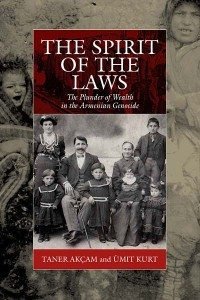The English translation of Taner Akçam and Ümit Kurt’s The Spirit of the Laws: The Plunder of Wealth in the Armenian Genocide was published in July 25. The book, which was translated by scholar Aram Arkun, examines the confiscation of Armenian properties during the genocide and subsequent attempts to retain seized Armenian wealth.

Through the close analysis of laws and treaties, The Spirit of the Laws reveals that decrees issued during the genocide constitute central pillars of the Turkish system of property rights, retaining their legal validity, and that although Turkey has acceded through international agreements to return Armenian properties, it continues to refuse to do so.
The book demonstrates that genocides do not depend on the abolition of the legal system and elimination of rights, but that, on the contrary, the perpetrators of genocide manipulate the legal system to facilitate their plans.
Taner Akçam holds the Kaloosdian and Mugar Chair of Armenian Genocide Studies at Clark University. His best-known books are A Shameful Act: The Armenian Genocide and the Question of Turkish Responsibility (Metropolitan Books, 2006); Judgment at Istanbul: The Armenian Genocide Trials, with Vahakn Dadrian (Berghahn Books, 2011); and The Young Turks’ Crime Against Humanity: The Armenian Genocide and Ethnic Cleansing in the Ottoman Empire (Princeton University Press, 2012), which in 2013 received the Middle East Studies Association’s Hourani Book Prize and was listed by Foreign Affairs as “Best International Relations Books of 2012.”
Ümit Kurt is a native of Aintab, Turkey, and holds a bachelor of science degree in political science and public administration from Middle East Technical University, and a master’s degree from Sabancı University’s Department of European Studies. He is currently a Ph.D. candidate in the Department of History at Clark University and an instructor at Sabancı University. His main area of interest is the confiscation of Armenian properties and the role of local elites/notables in Aintab during the genocide.



Be the first to comment